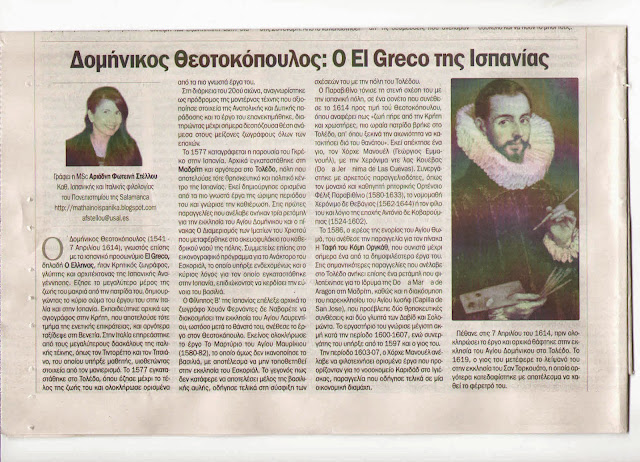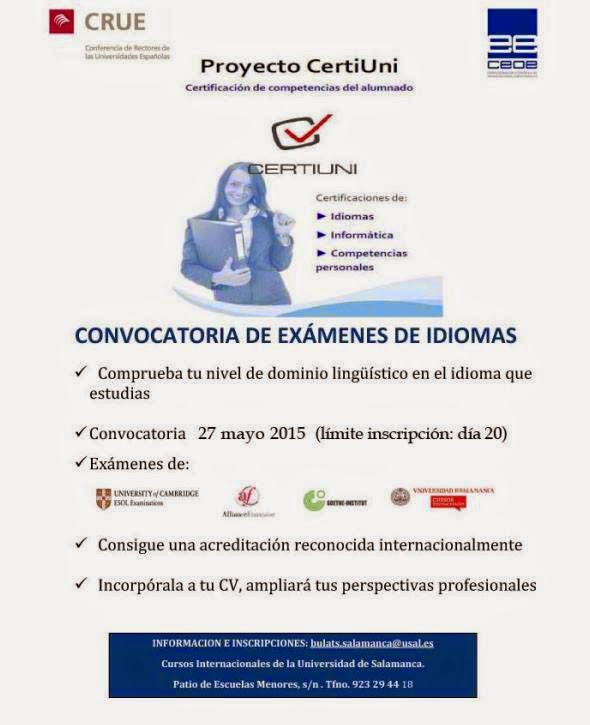miércoles, 27 de mayo de 2015
martes, 26 de mayo de 2015
¡Cursos de verano en la Universidad Complutense!
"NUEVAS EXIGENCIAS EN EL ÁMBITO DEL
APRENDIZAJE, LA ENSEÑANZA Y LA
GESTIÓN EDUCATIVA DE LENGUAS
EXTRANJERAS"
Martes 26 de mayo ¡Muy buenas!
 Η Ίμπιζα (ισπανικά: Ibiza, προφέρεται: [iˈβiθa], καταλανικά: Eivissa, προφέρεται: [əjˈvisə]) είναι η μεγαλύτερη από τις νήσους Πιτυούσες που
ανήκουν στο αρχιπέλαγος και την ομώνυμη αυτοδιοικούμενη περιφέρεια των
Βαλεαρίδων νήσων, στην Ισπανία. Έχει εμβαδόν 572 χμ² και πληθυσμό 133.702 κατοίκων
(2013).
Η Ίμπιζα (ισπανικά: Ibiza, προφέρεται: [iˈβiθa], καταλανικά: Eivissa, προφέρεται: [əjˈvisə]) είναι η μεγαλύτερη από τις νήσους Πιτυούσες που
ανήκουν στο αρχιπέλαγος και την ομώνυμη αυτοδιοικούμενη περιφέρεια των
Βαλεαρίδων νήσων, στην Ισπανία. Έχει εμβαδόν 572 χμ² και πληθυσμό 133.702 κατοίκων
(2013).
Το νησί της Ίμπιζα
είναι πολύ γνωστό για τα καλοκαιρινά πάρτι του, και χιλιάδες τουρίστες το
πλημμυρίζουν την βραδινή ζωή του. Ένα από τα πολλά διάσημα κλαμπ, μπαρ και καφέ
του νησιού είναι και το Καφέ ντελ Μαρ.
domingo, 24 de mayo de 2015
sábado, 23 de mayo de 2015
viernes, 22 de mayo de 2015
Convocatorias DELE
Cursos Internacionales de la Universidad de Salamanca ofrece, como centro examinador, las siguientes convocatorias anuales para la realización del Diploma de Español como Lengua Extranjera.
jueves, 21 de mayo de 2015
¿Qué es la Primera comunión?
Una primera comunión es un ritual sacramental de una Iglesia católica, por medio del cual una persona, generalmente menor de edad, participa por primera vez del sacramento de la Eucaristía recibiendo la Comunión (recibir el cuerpo y la sangre de Jesucristo), siendo un requisito obligatorio haber obtenido antes el sacramento del Bautismo y el de la Penitencia o confesión.
"La Primera Comunión" es practicada generalmente por niños de entre siete y doce años, generalmente de forma colectiva, aunque es aceptado en dicha religión que una persona celebre del rito a cualquier edad, siempre y cuando reciba preparación previa al sacramento y cumpla con los requisitos.
La ceremonia de la Primera Comunión ocurre siempre entorno a una celebración eucarística, o liturgia y en todos los casos debe ser oficiada por un sacerdote. Si bien este rito es principalmente convocado por la religión católica, otras iglesias cristianas también suelen practicarlo.
martes, 19 de mayo de 2015
lunes, 18 de mayo de 2015
Learning a language in later life: are you ever too old?
Ronald Williams, 85, started learning Welsh, his native language, at the age of 70. He grew up in south Wales, where he was raised and educated in English, and since the age of 23 has lived and worked in Solihull, near Birmingham. After retiring he decided that he wanted to reconnect with his roots: “I’m a Welshman and everybody should be able to speak their national language.”
With more time on his hands, he started looking on the internet for ways to learn Welsh, but the exercises he found didn’t help him with pronunciation. Two years ago, he started learning with Say Something in Welsh, which offers a series of podcasts and runs twice-monthly classes with a teacher, where he meets and practises with other language learners.
Williams is one of a cohort of older adults learning languages in later life. While the general consensus is that the younger learner has stronger powers of mimicry and retention, there is no evidence to suggest that adult learners are slower in terms of absorbing new information, according to Anil Biltoo, head of languages at SOAS, University of London. Instead, he says the key element to being a successful language learner is motivation.
“I was excited at the prospect of learning a language,” says Williams. “I regret not doing it in my younger days. When you’re bringing up a family and working you’re committed to those things. Learning a language and meeting people is exciting. It’s nice to go out and I look forward to [it].”
Learning a language could potentially help to ease the growing concern around isolation and loneliness among older people in the UK: “It’s so good to have an interest,” says Williams. “Loneliness is a terrible thing. I would hate to have to sit in a chair and rely on somebody knocking on the door to open my mouth.”
“Going to a class is socialising ... if you get out and you’re with other people that’s a benefit for sure,” she says. “Languages give you a little bit of a wider perspective on the world. Whether it was your interest to begin with or not, you do learn something of the culture of the country.”This is something that Yan Christensen can relate to. Christensen, a Danish 77-year-old retiree who has lived in the UK since she was 18, has been learning Russian for 10 years. She says she started because she “needed something to keep the grey cells going”. She is also interested in Russian literature and likes the sound of the language, and that it has a fairly complicated grammar. As a member of the University of the Third Age, which facilitates study groups for retired and semi-retired people, she runs two language groups.
It was this wish to learn more about other cultures that motivated Barbara Glasson to learn Urdu at 57. It is the first language she has learnt since studying a smattering of French at school.
As a methodist minister leading an interfaith project in Bradford, where a large chunk of the population is of Pakistani heritage, she decided to learn Urdu two years ago to engage with her community and help her on visits to Pakistan. She takes group classes at Bradford College once a week.
“Language is always the link between human beings and so often our point of connection,” she says. “It’s easy for English people to be idle because everybody speaks English. I was determined to have a go at communicating differently.”
“Just having the basics has been really helpful and the same applies in Pakistan. If I can just show willing, it shows that I’m not the white British person expecting everyone to be fluent in English,” she adds.
That’s not to say learning a language later in life is without its challenges. Having already learnt English and German, Christen said she finds learning a language harder now because it takes more repetition before the words stick. Williams also says he finds it more difficult remembering new Welsh vocabulary than he would have 10 or 15 years ago.
Although learning a new language may not always be easy for older adults, research suggests it can help slow down age-related cognitive decline. One study, which examined the medical records of 648 Alzheimer’s patients in the Indian city of Hyderabad found that bilinguals developed dementia four to five years later than monolinguals. This point has not escaped Williams, who believes if you don’t use it you lose it.
Biltoo says those coming to a language later in life have had exposure to foreign languages from travel to other countries. “What you also find is that they devote more time to their studies and they don’t have the pressures the undergraduate faces in terms of time management,” he adds.
“It’s worth having a go. That’s what it’s taught me,” says Glasson. “I’ll never be proficient or fluent or able to have a philosophical conversation in Urdu with anybody, but I can make a human link and that’s worth it just because it’s a step towards people.”
domingo, 17 de mayo de 2015
viernes, 15 de mayo de 2015
miércoles, 13 de mayo de 2015
Miércoles 13 de mayo ¡Buenos días!
https://www.facebook.com/events/1103909012953378/?feed_story_type=263
¡Preinscripción 2015-2016 para iniciar estudios en la Universidad de Salamanca!
http://exlibris.usal.es/index.php/es/requisitos-de-acceso
PREINSCRIPCI
PREINSCRIPCIÓN 2015-2016 PARA INICIAR ESTUDIOS EN LA UNIVERSIDAD DE SALAMANCAÓN 2015-2016 PARA INICIAR ESTUDIOS EN LA UNIVERSIDAD DE SALAMANCA
¡Preinscripción 2015-2016 para iniciar estudios en la Universidad de Salamanca!
http://exlibris.usal.es/index.php/es/requisitos-de-acceso
PREINSCRIPCI
PREINSCRIPCIÓN 2015-2016 PARA INICIAR ESTUDIOS EN LA UNIVERSIDAD DE SALAMANCAÓN 2015-2016 PARA INICIAR ESTUDIOS EN LA UNIVERSIDAD DE SALAMANCA
martes, 12 de mayo de 2015
lunes, 11 de mayo de 2015
Curso para examinadores DELE
CURSO DE FORMACIÓN Y ACREDITACIÓN DE EXAMINADORES DELE EN LÍNEA A1-A2 EN LÍNEA
domingo, 10 de mayo de 2015
jueves, 7 de mayo de 2015
¡El español avanza en el mundo!
El español es un filón cultural, pero también económico. Con esa premisa se dio cita, la semana pasada, en Madrid, un amplio abanico de sectores que trabajan con la materia prima de la lengua con la finalidad de potenciar su cohesión y desarrollo.
El español es "el patrimonio más potente que tenemos los países hispanohablantes", aseguró a Efe Luis Eduardo Cortés, presidente de Ifema, organizadora junto a Plataforma del Español del foro. "Un patrimonio que hay que potenciar entre los 21 países que tienen el español como lengua madre, sin protagonismos", insiste Cortés, al augurar un "porvenir maravilloso" a una lengua que, "está en gran medida en manos de los países latinoamericanos".
Sin olvidar, apunta, a Estados Unidos, que en 2050 será el país no hispano con más hispanohablantes. Ahora son 52 millones.
Con un milenio de historia, el español es ahora el segundo idioma nativo más hablado del mundo con más de 540 millones de personas, seguido del chino mandarín. Y el segundo en los negocios, tras el inglés, así como la tercera lengua más usada en el ciberespacio.
domingo, 3 de mayo de 2015
viernes, 1 de mayo de 2015
¡Día Internacional de los Trabajadores!

El Día Internacional de los Trabajadores o Primero de Mayo es la fiesta por
antonomasia del movimiento obrero mundial. Es una jornada que se ha utilizado
habitualmente para realizar diferentes reivindicaciones sociales y laborales a
favor de las clases trabajadoras por parte, fundamentalmente, de los
movimientos socialistas, anarquistas y comunistas, entre otros.
Desde su establecimiento en la mayoría de países (aunque la consideración
de día festivo fue en muchos casos tardía) por acuerdo del Congreso Obrero
Socialista de la Segunda Internacional, celebrado en París en 1889, es una
jornada de lucha reivindicativa y de homenaje a los Mártires de Chicago.
Suscribirse a:
Entradas (Atom)
-
https://elpais.com/cultura/2018/06/01/actualidad/1527865066_385241.html
-
Hoy, 8 de diciembre se celebra el Día de la Inmaculada Concepción . Una festividad muy importante, que tiene su origen en el Milagro ...















.jpg)
.jpg)
.jpg)








.jpg)

.jpg)
.jpg)

.jpg)


.jpg)
.jpg)
.jpg)



.jpg)




